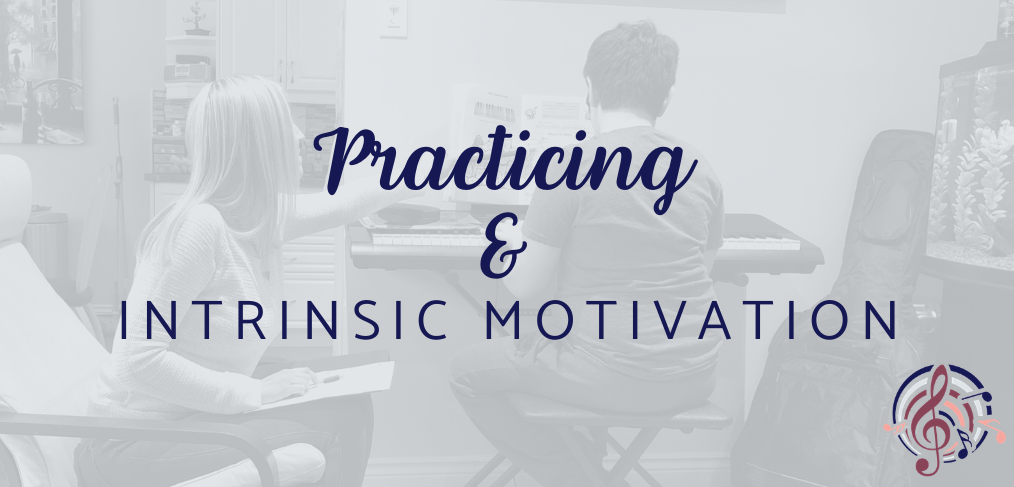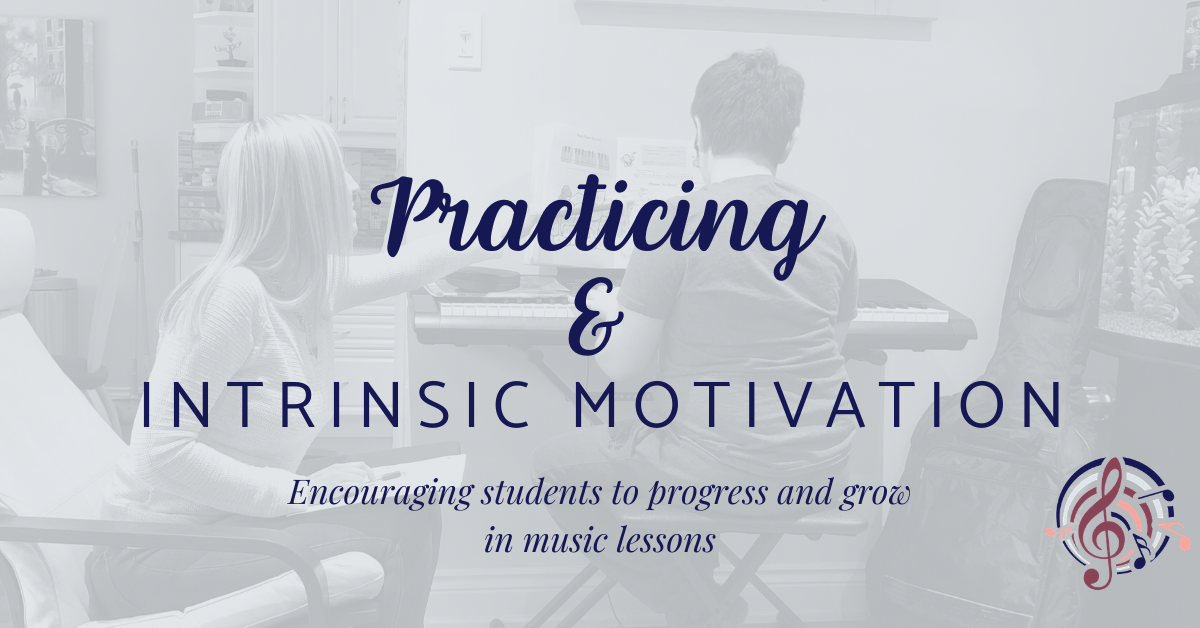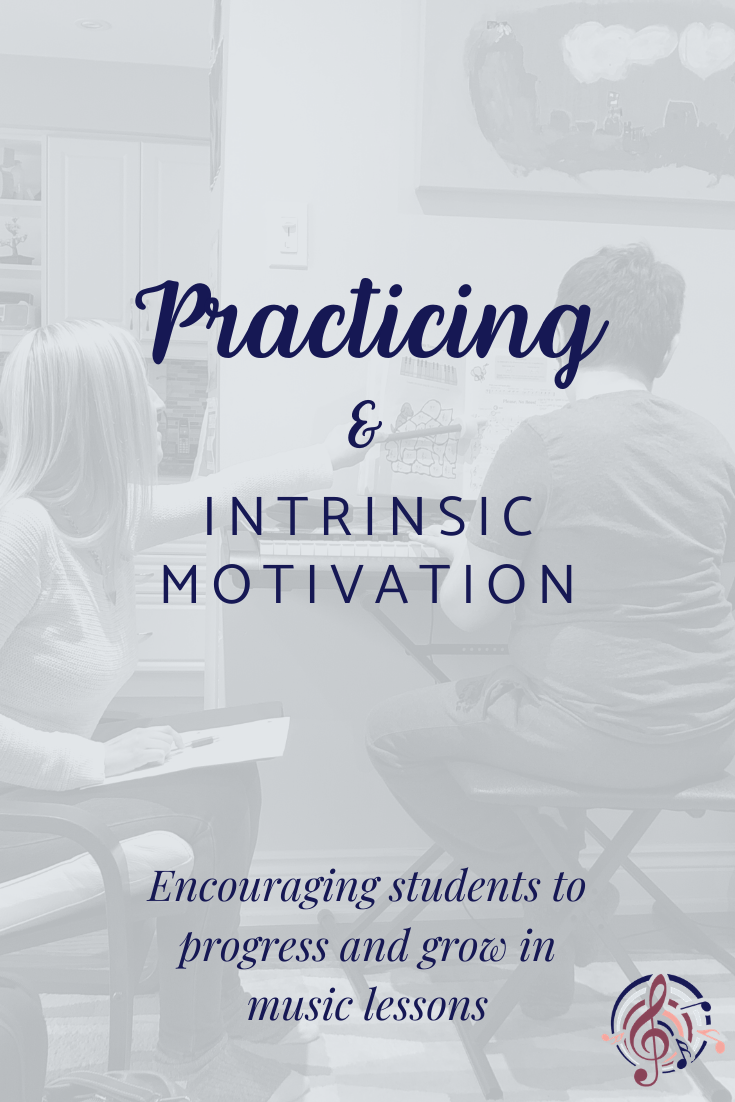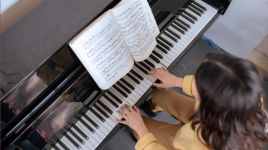
Practicing and Intrinsic Motivation
Encouraging students to progress and grow in music lessons
Written by Tamara Leszner-Rovet
With the new year now upon us, it is a time for reflection and resolutions, including when it comes to music lessons. One aspect of music lessons that comes up frequently in conversation, especially at the beginning of a new term, is practicing.
In general, I have found that the key to long term progress, success, and enjoyment of playing an instrument is intrinsic motivation.
Intrinsic motivation refers to behaviour that is driven by internal rewards. The motivation to engage in a behaviour arises from within the individual because there are natural rewards associated with it. In other words, students practice because they want to progress (similar to playing sports, where there is a motivation to practice in order to develop the strength and skills to progress). In my experience, students who want to practice their instrument and continue to progress are the ones who reap the most benefits and rewards for themselves, and are more likely to continue lessons long-term.
Extrinsic motivation typically doesn’t work well as a long term solution. Rewards such as candy, toys, etc. may not be effective when it comes to music practicing. This is not to say that they won’t work in the short term, but often they satiate and eventually are no longer motivating. The point is that practicing equates to further progress, which is motivation in itself. While rewards may not be an optimal long-term way to motivate, positive reinforcement (strengthening an action with praising words, a pat on the back, performing for others, etc.) can help to further encourage growth and skills to develop intrinsic motivation.
Saying this, it is natural that intrinsic motivation will begin to occur as a student gets older, and is able to take responsibility for their own practicing and progress. Every student is different but in most cases, I see this in students as early as age 7. For younger students, it is completely normal that parents or caregivers may need to intervene to help facilitate with practicing until the student is able to do this on their own – adult supervision and assistance is definitely encouraged for younger children who do not yet have the skills or abilities to facilitate their own practicing.
Here is my “top 10” list of ways I have found to be the most effective to help instill intrinsic motivation:
-
- Establishing long term goals: finishing a current method book, completing a Royal Conservatory Music exam, participating in a local music festival or competition, or participating in our end-of-the-year party and recitals are all wonderful ways to have a goal to work toward. If one goal is successful, it motivates students to work toward more goals in the future!
- Learning motivating music: beyond method books and the importance of learning the foundations of music, it is so important that students be given the opportunity to learn music that is meaningful to them. I have taught everything from pop songs, national anthems, TV show and video game themes, and everything in between!
- Allowing students to take responsibility for their own practicing and progress: every student is different. Some students practice consistently and can’t wait to progress each lesson. Other students may be content practicing only at their lesson, and though there may not be much progress, there is still learning involved. Allowing the student to be involved in practice requirements (e.g., areas of strength, need, number of repetitions, pinpointing trouble spots, etc.) and practicing routines at home can give students a sense of confidence and trust, which in turn can help keep them motivated.
- Exposure to live music: taking students to concerts, local music festivals, the symphony, etc. can show students the value of hard work, and help motivate them to practice, as well as expose them to different types of musical genres that they may want to explore.
- Composing: letting students create their own music with facilitation from their teacher can be creative and inspiring!
- Practicing should not be forced: as mentioned above, at a certain age students can take responsibility for their own practicing outside of the lesson and are therefore responsible for their own progress. Forced practicing can sometimes deter a student from being motivated rather than encouraging it, and sometimes it is most effective for students to face the natural consequences if they choose not to practice.
- If a student doesn’t want to practice outside of the lesson, find out why: often it may be because they feel a song is too difficult, they don’t have a proper instrument or the instrument is in an undesired location (e.g., in their basement), may forget the instructions, or do not have a long term goal (e.g., recital or an exam). Perfectionistic tendencies and anxiety can also be a hinderance.
- Consistent lessons: both during the school year and in the summer can keep progress and motivation high so that momentum is not lost. As well, those who are intrinsically motivated typically want lessons to keep going so they can continue to learn and grow as musicians!
- Do not skip lessons if no home practice has occurred: this is an opportunity for students to review assigned work with the teacher at length and pinpoint any obstacles at home (e.g., waiting until the end of the week to get all practicing done and forgetting what needed to be done, too much homework, etc).
- Open and honest communication with the student’s music teacher: this is strongly encouraged for both students and parents/caregivers. As a teacher myself, it is so helpful to be aware of any potential issues as soon as they arise so they can be resolved quickly. This ensures the student can get the most out of their lessons, as well as enjoy the process!
It is important to note that by no means is this list a “one size fits all.” Every student is different and has their own strengths and needs, and it is the teacher’s role to determine what will work best for each student on a case by case basis to ensure they are motivated and set up for success. It is the hope that the student themselves can be instinctively motivated. For example, students who are older may still need help or reminders from a parent or caregiver to practice for various reasons, and can still be intrinsically motivated to progress and enjoy playing!
When a parent approaches me thanking me because their child can’t wait practice and that they can see the pure joy in their child’s face when making music (and in some cases, have to pry their child away from their instrument to move on with their day!), it truly warms my heart and is one of the many reasons why I am so passionate about what we do here at TPSMTS!





